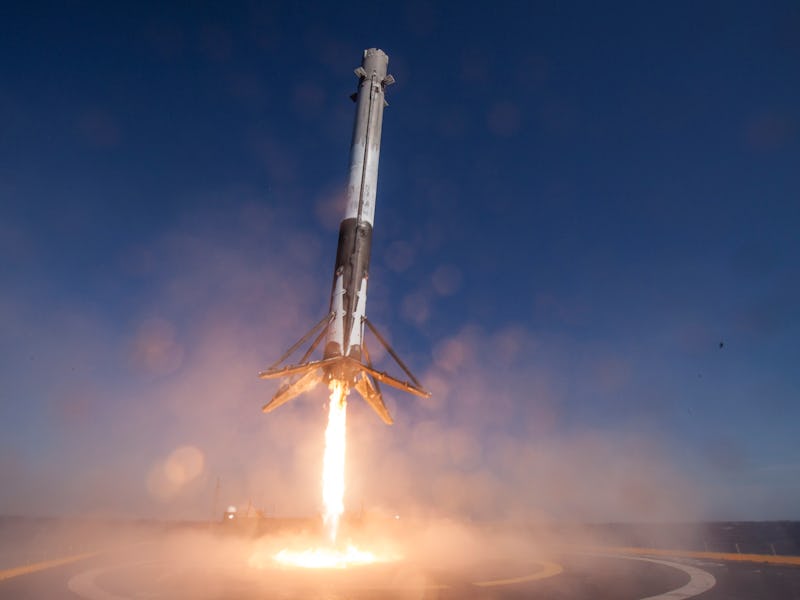SpaceX: Space Force partnership kicks off a new chapter for the Falcon 9
By using a reusable booster, the newest branch of the military signals openness to this cornerstone of Elon Musk's rocketry company.

SpaceX will launch a critical Space Force satellite on a previously-used rocket later this week for the first time, which could cement SpaceX’s reusable rockets as safe for the Space Force’s operations.
SpaceX has already launched three Space Force satellites into orbit on fresh rockets, the first launch with a reused rocket is planned for Thursday, June 17, with the launch of the GPS III SV05 satellite.
This satellite is the final piece of hardware the Space Force needs in orbit to complete its network of M-Code satellites, which are purported to be more resistant to jamming and cyberattacks.
The SV05 will be the 24th M-Code satellite currently in orbit, according to Space Coast Daily, which is the minimum to start using the more secure GPS signal. However, other delays mean the signal won’t be operational until 2023.
But with this change to the original GPS satellite launch contract, the Space Force has streamlined the process between launches and saved about $64 million, according to CNBC.
This launch is a significant mark of approval for SpaceX, as the Space Force now trusts the company’s used rockets with payloads deemed vital to national security. SpaceX had previously launched sensitive missions for the U.S. military, but never with used rockets. These launches include a classified Air Force space drone and a National Reconnaissance Office spy drone.
The Space Force flag, which surely coincidentally looks like a Starfleet insignia.
Which rocket is being reused?
The United States Air Force awarded SpaceX five of the six GPS III satellite launches, though the original launch of the first satellite in 2018 was conducted with a disposable rocket.
The Air Force then allowed SpaceX to recover the rockets used for the second and third launches for reuse on other missions — but not until now for military launches. (The Space Force wasn’t officially created until December 2019.)
The GPS III SV05 satellite will be the fourth SpaceX launch, using the same Falcon 9 rocket used to launch the GPS III SV04 satellite in 2020, which was safely recovered after an eight-and-a-half minute journey on the drone ship Of Course I Still Love You.
The rocket’s original launch on October 2, 2020, had an issue that caused the mission to abort two seconds before liftoff, which was found to be a blocked valve in the engine’s gas generator. The valve was replaced and the rocket launched successfully a month later, on November 5, 2020.
Walter Lauderdale, deputy mission director of the U.S. Space Force’s Space and Missiles Systems Center, told reporters that his department had reviewed more than 440 changes to the Falcon 9 between launches and completed nearly 400 verification steps.
“Since we’re using the same booster again, we didn’t have to look at all the build paperwork for a first flight — we just had to look at what they did for refurbishment,” Lauderdale said, according to Air Force Magazine.
And once this mission is finished, SpaceX can also use the rocket for other non-military missions — the Space Force isn’t claiming exclusive use of the rocket.
What does this mean for SpaceX?
After the launch on June 17, the Space Force’s acceptance of reused SpaceX rockets only means life gets easier for both agencies.
“We continue to work with [SpaceX] and, looking ahead to the SV06 mission next year … we’ll be working with them as to what boosters are available,” Lauderdale said. “We are certainly open to using other boosters, not just ones that have flown [for Space Force].”
SpaceX will no longer have to build new rockets for each Space Force launch, and the Space Force won’t have to wait for those rockets to be built. And without restrictions on reusability, this means SpaceX has earned the trust to use rockets that have flown more than twice on Space Force missions, as well.
This also gives the Space Force experience in reviewing and validating reusable rockets, which will likely be used in other projects.
For instance, the Space Force announced earlier this year it was expanding its “Rocket Cargo” program, which will attempt to use spacecraft to quickly transport cargo anywhere around the world. The economics of this scheme only work when the rocket is reused, and SpaceX is one of the two companies publicly working with the Space Force on the initiative.
But the future of SpaceX’s military rocket reuse all rests on SpaceX’s successful launch from Cape Canaveral this Thursday, June 17. The launch is scheduled for 12:09 p.m., with a 15-minute launch window. If conditions are unfavorable, there is another launch window scheduled for 12:05 p.m. the next day, June 18. SpaceX will attempt to recover the Falcon 9 rocket booster on the drone ship called Just Read The Instructions.